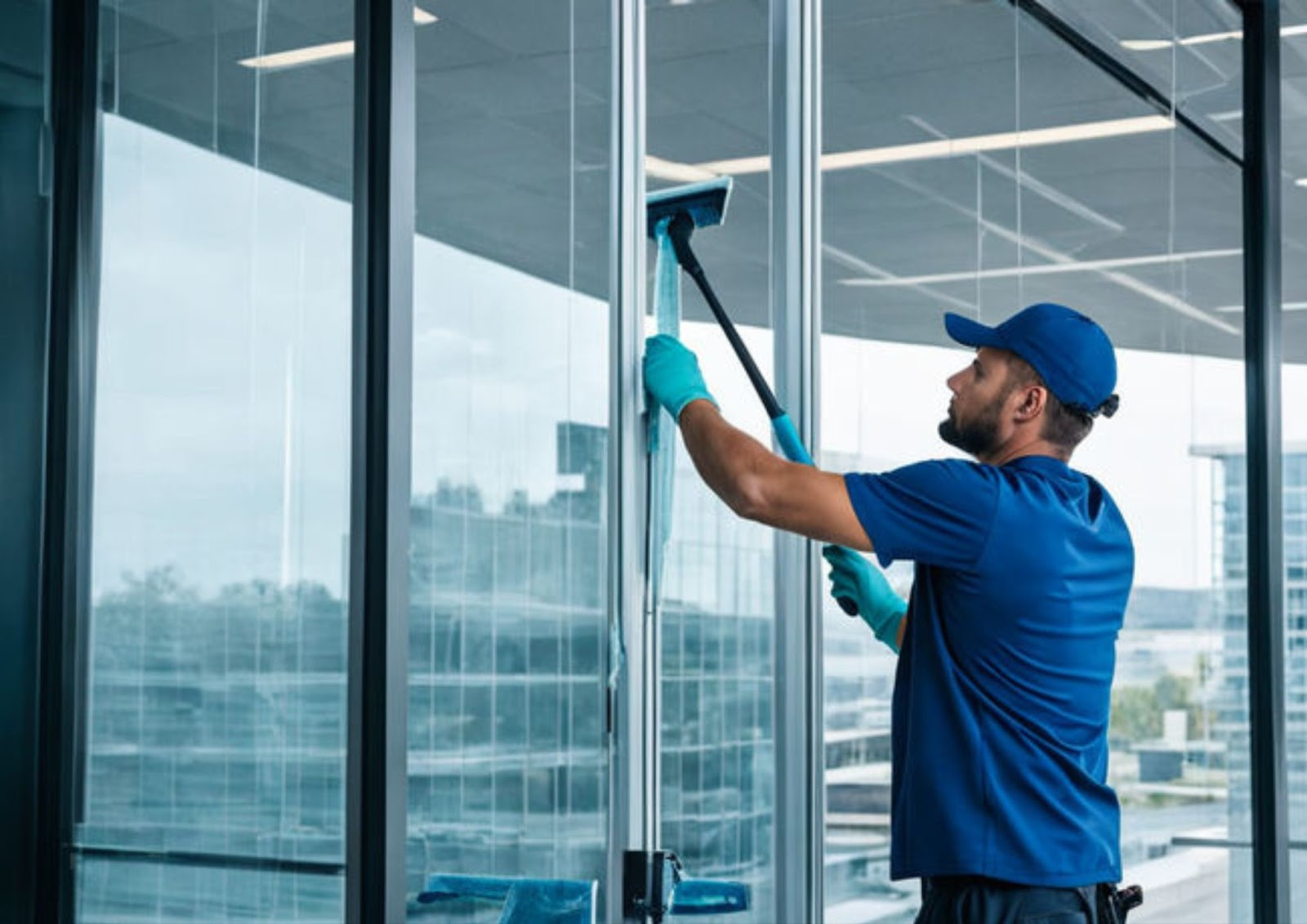You put effort into keeping your store clean. Floors are spotless, shelves are stocked, and displays look perfect. But if your doors are covered in fingerprints, dust, or grime, that’s the first thing customers notice.
Doors are often overlooked, even though they’re among the most touched surfaces in a store. A dirty entrance makes a bad impression and, worse, spreads germs. Customers and employees touch the same handles all day, but how often do they get cleaned?
Neglecting door maintenance can lead to wear and tear, costly repairs, and even safety issues. A simple cleaning routine and a few preventative steps can keep doors looking spotless, professional, and welcoming.
In this blog, you’ll learn the best cleaning techniques, common mistakes to avoid, and how to maintain clean doors in retail spaces all year.
What Dirty Doors Say About Your Business
Customers make snap judgments before they even step inside. If your doors are smudged, streaked, or covered in grime, you send the wrong message. This makes shoppers question how clean the rest of the store is and whether you care about the details.
A neglected entrance can make a business look unprofessional, even if the inside is spotless. It suggests a lack of attention to store cleanliness, which can drive customers away. In a competitive retail environment, that first impression matters. People want to shop in a welcoming and well-maintained space, not one that looks like it hasn’t been cared for.
Clean doors make a difference in how customers perceive your store, how safe the shopping environment is maintained, and how long your doors last. It doesn’t take much to keep them looking fresh. Let’s go over the best ways to keep your doors looking spotless.
Best Cleaning Tips for Retail Doors
Keeping your doors clean is simple. You just have to know what to clean, how often to do it, and which products to use.
Make Daily Touch-Ups a Habit
Doors in high-traffic stores collect fingerprints, smudges, and dust fast. A quick wipe-down with a microfiber cloth and a streak-free cleaner keeps them looking fresh. Pay extra attention to handles, push plates, and glass panels. These spots get the most contact.
Deep Clean Regularly
A full thorough cleaning once a week removes built-up grime that daily wipes might miss. Use a gentle cleaner for glass doors, a disinfectant for high-touch areas, and a damp cloth for wooden or metal frames. If your doors have automatic sensors or tracks, check for dirt buildup that could affect their function.
Use the Right Cleaning Products
Harsh chemicals can damage glass, corrode metal, or strip the finish off wooden doors. Stick to non-abrasive cleaners, avoid anything ammonia-based on glass, and test new products on a small area first. If you’re looking for an eco-friendly option, a mix of vinegar and water works well on most surfaces.
Key Areas for Cleaning in Retail Stores
Doors aren’t the only thing customers notice. A spotless entryway, checkout area, and dressing room make a big difference in how shoppers perceive your store. These high-traffic areas collect dirt fast and need regular cleaning to stay fresh and inviting.
Entrance and Exit Areas
The entrance is where first impressions happen. If doors are covered in fingerprints and the floors are scuffed or dirty, customers hesitate before walking in. Wiping down door handles, push plates, and glass panels throughout the day keeps the entrance looking polished.
Floors near entryways take a beating from foot traffic. Sweeping and mopping floors regularly prevents dirt from spreading further into the store. Placing floor mats inside and outside helps trap dust and debris, cutting down on how often deep cleaning is needed.
Checkout Areas
Checkout counters see constant action. Between card swipes, bagging, and cash handling, germs build up fast. Wiping down keypads, card readers, and counters throughout the day keeps things clean and hygienic.
A sticky or cluttered checkout area slows down transactions and leaves customers with a bad last impression. Regularly sanitizing surfaces like checkout counters and payment stations ensures a cleaner, more professional environment for employees and shoppers.
Dressing Rooms
Dressing rooms get messy fast. Mirrors collect fingerprints, floors pick up dust and lint, and benches get covered in everything from clothing fibers to makeup smudges. A quick wipe-down of surfaces throughout the day keeps things looking clean and polished.
Vacuuming or mopping floors daily prevents dirt from piling up. Customers expect a fresh, comfortable space to try on clothes, and a well-maintained dressing room makes the shopping experience feel more enjoyable.
Tricks to Keep Retail Doors Clean for Longer
Most of the grime on doors comes from customers bringing in dirt and dust from outside. Placing high-quality entry mats at every entrance helps trap debris before it reaches your doors. Use heavy-duty mats inside and outside, and shake them out or vacuum them daily to keep them working effectively.
Glass doors collect fingerprints fast, especially in busy stores. Installing push plates on manual doors gives customers a designated spot to push, reducing smudges on the glass. Automatic doors go further by limiting hand contact entirely, helping entryways stay clean longer.
Employees also contribute to the buildup as they move through doors throughout the day. Keeping cleaning supplies near checkout counters or stockrooms makes it easy for staff to wipe down doors as they go. A quick cleaning routine prevents grime from piling up and keeps doors looking polished.
Schedule Professional Cleanings for Long-Term Maintenance

Some buildup won’t come off with a daily wipe-down. Over time, glass doors develop streaks, metal doors collect grime, and wooden doors need conditioning to prevent drying out. Scheduling retail cleaning services at least once a month removes stubborn residue and helps doors last longer without damage.
For even more extensive cleaning, businesses often turn to commercial cleaning services to handle deep cleaning tasks beyond regular maintenance. These services make sure high-traffic areas stay fresh, especially in large retail spaces.
These simple tricks cut down on daily cleaning and keep doors looking sharp. But even the best cleaning routine can go wrong if common mistakes aren’t avoided.
Common Mistakes to Avoid When Cleaning Retail Doors
Cleaning doors seems simple, but small mistakes can make them look worse or even cause damage. Avoid these common missteps to get the best results.
Using the wrong cleaning products can ruin doors. Ammonia-based cleaners leave streaks on glass and wear down protective coatings. Abrasive cleaners scratch metal and strip finishes off wood. Use non-abrasive, streak-free cleaners designed for the material you’re cleaning.
High-touch areas like door handles, push plates, and frames collect the most dirt but often get wiped last or not at all. Customers and employees touch these areas constantly, which means they build up grime fast. A quick disinfectant wipe throughout the day keeps them clean and reduces germ buildup.
Over-spraying glass cleaner can cause drips that seep into edges and damage seals, metal frames, or wood finishes. Instead of spraying directly onto the door, apply the cleaner to a microfiber cloth first, then wipe. This prevents damage and gives you better control over streaks and residue.
Keep Doors Clean Year-Round With Preventative Maintenance
A solid cleaning routine keeps doors looking fresh, but preventative maintenance helps them last longer. Dirt, weather, and constant use wear down doors over time, leading to expensive repairs if ignored. A little upkeep goes a long way in keeping doors functional and looking professional.
Adjust Cleaning Based on the Season
Winter brings salt and moisture that leave streaks and cause corrosion on metal doors. In summer, dust and pollen stick to the glass, making it look cloudy. Adjust your cleaning schedule based on the season to stay ahead of buildup before it becomes a bigger problem.
Check for Minor Damage Before It Gets Worse
Scratches, peeling paint, and loose handles might seem small, but they can turn into costly repairs if left alone. Regularly inspect doors for wear and tear and fix minor issues before they become major problems.
Use Work Order Software to Stay on Top of Maintenance
Scheduling regular door inspections and cleaning tasks keeps everything operational. Facility maintenance software helps you manage cleaning schedules, request repairs, and track maintenance history without paperwork.
Get Clean & Well-Maintained Retail Doors Without the Markups

Keeping retail doors clean and well-maintained should not be expensive or complicated. Trillium helps businesses manage facility maintenance without hidden fees, long-term contracts, or unnecessary on-site personnel. Get reliable service without overpaying or dealing with outdated facility management systems.
With Trillium’s facility maintenance software, you can submit and manage work orders anytime from anywhere. Whether it is routine door cleaning, HVAC maintenance, or emergency repairs, Trillium connects you with trusted professionals who get the job done. Pay only for the services you use, with no inflated costs or commitments.
Why businesses choose Trillium over traditional facility management:
- No fees or markups
- No minimum order volumes or long-term commitments
- No unnecessary on-site personnel
- 24/7 service management across 47 states
Retail maintenance should be simple and cost-effective. Work with Trillium for professional service and reliable maintenance.
FAQs About Clean Doors in Retail Spaces
How do you clean commercial doors?
Start by removing loose dust and dirt with a dry microfiber cloth. For glass doors, use a streak-free glass cleaner and wipe in circular motions to avoid streaks. Metal and wooden doors require a damp cloth with a mild detergent or specialized cleaner to prevent damage.
Focus on high-touch areas like handles, push plates, and frames, and finish with a disinfectant to keep germs at bay.
What’s the best thing to clean doors with?
It depends on the door material. For glass, a non-ammonia glass cleaner and a microfiber cloth work best. For metal doors, a mild soap-and-water solution removes grime without corroding the surface.
Wooden doors need a gentle wood cleaner or a mix of warm water and mild dish soap to prevent drying out the finish. Always avoid abrasive cleaners that can scratch or damage the door’s surface.
How do you get greasy finger marks off wooden doors?
A mix of warm water and mild dish soap cuts through grease without damaging the wood. Dip a microfiber cloth in the solution, wring it out, and gently wipe the affected area. For tougher grease stains, a small amount of vinegar diluted in water can help, but always test on a hidden spot first to avoid damaging the finish.
What does a commercial deep clean include?
A commercial deep clean includes washing glass doors, disinfecting handles and push plates, removing scuff marks from door frames, and polishing metal or wood finishes. Deep cleans often extend to surrounding areas like entryways, checkout counters, and dressing rooms to maintain a fully sanitized and professional-looking space.









